WESCO International Bundle
Who Really Controls WESCO International?
Understanding a company's ownership is like having the key to its future. From its humble beginnings as a Westinghouse Electric subsidiary, WESCO International has undergone a dramatic transformation. This deep dive into WESCO International SWOT Analysis will uncover the key players and pivotal moments that have shaped its ownership landscape.
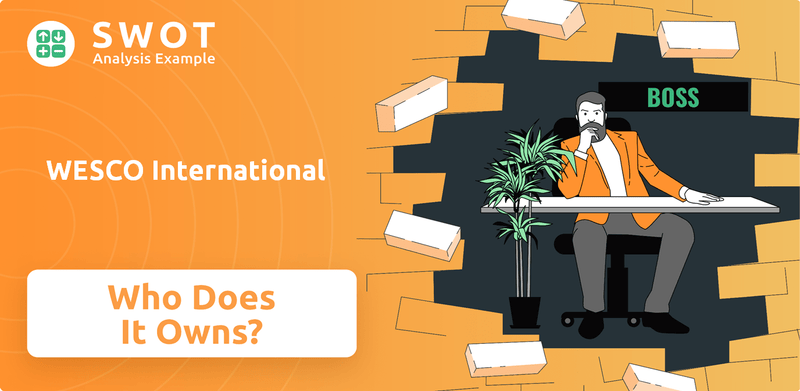
This analysis will explore the evolution of WESCO ownership, revealing the major shareholders and their influence. We'll examine the WESCO stock dynamics and how the WESCO company profile reflects its ownership structure. Discover the current WESCO leadership and how it impacts the company's strategic direction, financial performance, and overall market position. This is a must-read for anyone interested in Who owns WESCO.
Who Founded WESCO International?
The early ownership of WESCO International, originally established in 1922, is closely tied to its origins as a distribution arm of Westinghouse Electric Corporation. Initially, WESCO functioned as a subsidiary, with its ownership entirely held by Westinghouse Electric. This structure meant that Westinghouse Electric controlled the sale and distribution of its electrical and industrial components through WESCO.
Information regarding specific founders or their initial equity stakes at WESCO's inception is not readily available. This is because WESCO began as a division within a larger corporation, rather than as an independent startup with individual founders or early investors.
The company's ownership underwent a significant transformation in 1994 when it was acquired by Clayton, Dubilier & Rice (CD&R), a private equity firm. This acquisition marked a shift from corporate ownership to private equity control, setting the stage for future developments.
WESCO's ownership history reveals a transition from corporate control to private equity management, influencing its strategic direction and financial performance. The company's journey provides insights into how ownership changes can reshape a business. For more details, you can explore Revenue Streams & Business Model of WESCO International.
- 1922: WESCO begins as a distribution arm of Westinghouse Electric Corporation.
- 1994: Clayton, Dubilier & Rice (CD&R) acquires WESCO.
- June 1998: The Cypress Group acquires WESCO from CD&R for $1.1 billion.
- These early transactions demonstrate the evolution of WESCO's ownership, from its roots within a large corporation to its eventual control by private equity firms, which ultimately led to its public listing.
WESCO International SWOT Analysis
- Complete SWOT Breakdown
- Fully Customizable
- Editable in Excel & Word
- Professional Formatting
- Investor-Ready Format
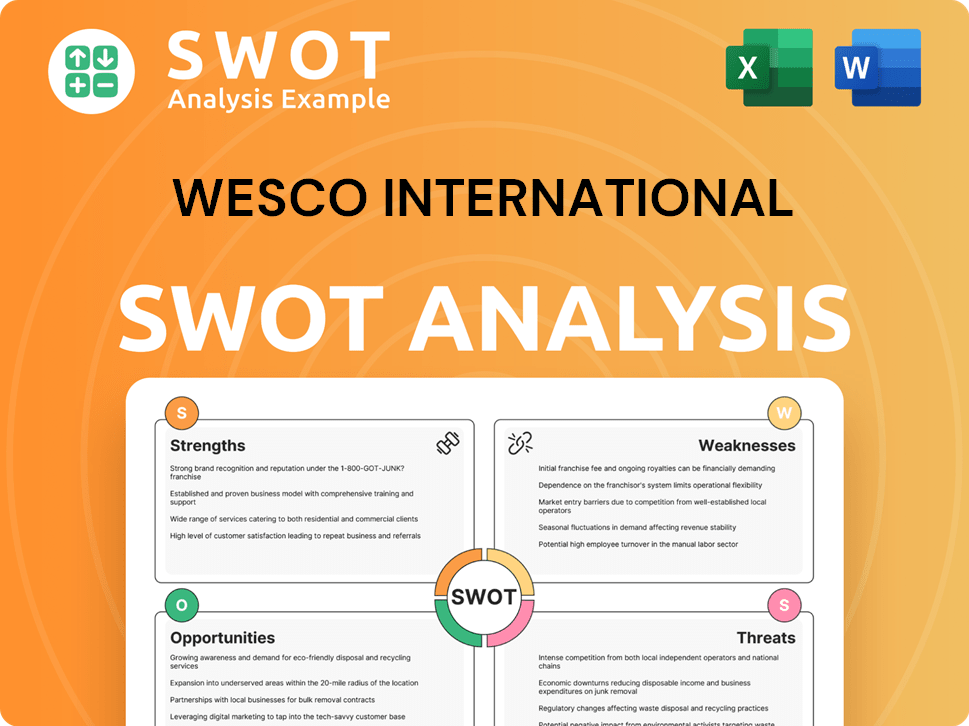
How Has WESCO International’s Ownership Changed Over Time?
The ownership of WESCO International has seen several pivotal shifts since its inception. Initially a subsidiary of Westinghouse Electric, it was acquired by Clayton, Dubilier & Rice (CD&R) in 1994. Subsequently, in June 1998, The Cypress Group purchased WESCO from CD&R for $1.1 billion, leading to the formation of WESCO International Inc. The company then transitioned to a public entity in 1999, with its shares listed on the New York Stock Exchange (NYSE) under the ticker symbol WCC. As of June 10, 2025, the market capitalization of WESCO International is approximately $8.75 billion.
The evolution of WESCO ownership reflects significant changes in its corporate structure. From its roots within Westinghouse to its acquisition by private equity firms and eventual public listing, each transition has reshaped the company's strategic direction and stakeholder influence. These changes highlight the dynamic nature of corporate ownership and its impact on business strategy and financial performance. Understanding the history of WESCO's ownership provides crucial context for analyzing its current market position and future prospects, including the influence of its major shareholders on its leadership and strategic decisions.
| Ownership Milestone | Date | Details |
|---|---|---|
| Westinghouse Electric Subsidiary | 1922 | Founded as a subsidiary. |
| Acquisition by CD&R | 1994 | Sold to Clayton, Dubilier & Rice. |
| Acquisition by The Cypress Group | June 1998 | Purchased for $1.1 billion, forming WESCO International Inc. |
| Initial Public Offering (IPO) | 1999 | Shares listed on NYSE under the ticker WCC. |
Currently, WESCO International's ownership is largely held by institutional investors, who collectively own 95.81% of the shares. Company insiders hold 11.08% of the shares, while retail investors hold a minimal 0.00%. Key institutional shareholders include Vanguard Group Inc., BlackRock, Inc., Dimensional Fund Advisors Lp, Baupost Group Llc/ma, and PointState Capital LP. For example, as of March 31, 2025, Vanguard Fiduciary Trust Co. held 9.442% of shares, amounting to 4,607,114 shares, and BlackRock Advisors LLC held 8.215%, representing 4,008,626 shares. Baupost Group Llc/ma increased its ownership by 39.70% during the quarter ending March 31, 2025, holding 2,005,601 shares valued at over $311 million. Green Equity Investors VII LP was noted as the largest individual WESCO International shareholder, owning 2.52 million shares, representing 5.17% of the company as of a recent report. These significant institutional holdings indicate their substantial influence on the company's strategic decisions and corporate governance. To further understand the competitive environment, consider the Competitors Landscape of WESCO International.
WESCO International's ownership structure is primarily dominated by institutional investors.
- Institutional investors hold the majority of shares, influencing strategic decisions.
- Key shareholders include Vanguard, BlackRock, and Dimensional Fund Advisors.
- The evolution of ownership reflects significant changes in corporate strategy.
- Understanding WESCO ownership is crucial for evaluating its market position.
WESCO International PESTLE Analysis
- Covers All 6 PESTLE Categories
- No Research Needed – Save Hours of Work
- Built by Experts, Trusted by Consultants
- Instant Download, Ready to Use
- 100% Editable, Fully Customizable
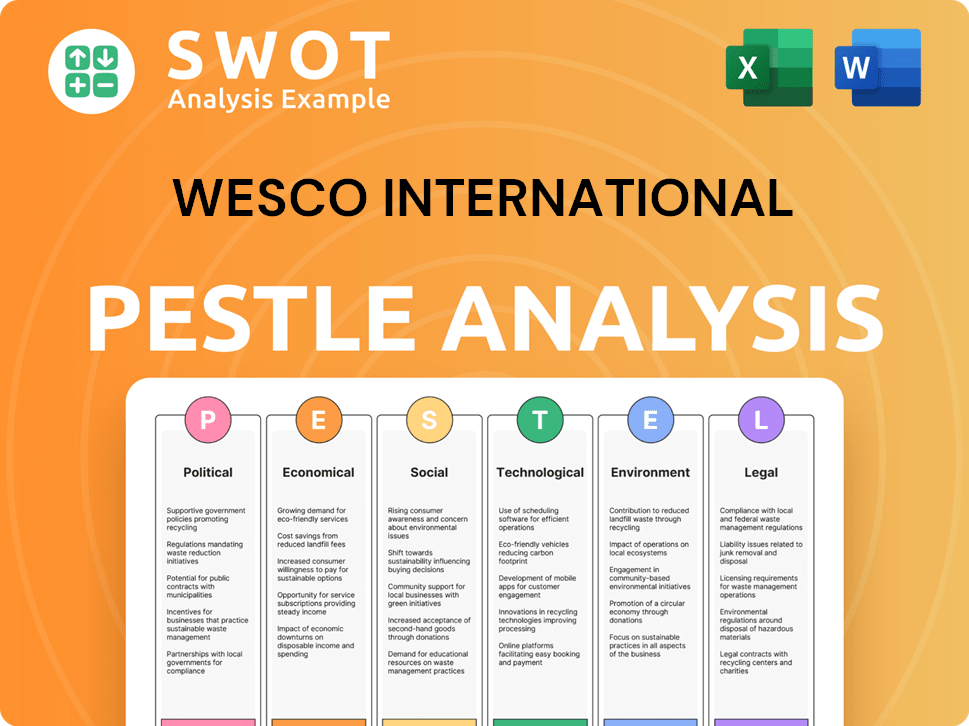
Who Sits on WESCO International’s Board?
As of May 22, 2025, the Board of Directors of WESCO International consists of ten elected directors. Each director serves a one-year term, expiring at the Annual Meeting of Stockholders in 2026. John J. Engel holds the positions of Chairman, President, and CEO. Other board members include Glynis A. Bryan, Matthew J. Espe, Bobby J. Griffin, John K. Morgan, Steven A. Raymund, James L. Singleton, Easwaran Sundaram, and Laura K. Thompson. Glynis A. Bryan also serves on the boards of Pinnacle West Capital Corporation and Ameriprise Financial Inc.
Kenneth T. Lamneck, who has been a director since 2013, chairs the Nominating, Sustainability, and Governance Committee. The composition of the board reflects a mix of experience and expertise, guiding the company's strategic direction. This structure is crucial for overseeing WESCO's operations and ensuring accountability to its shareholders. The board's role is vital in maintaining corporate governance and representing the interests of all stakeholders. To understand more about the company's strategic direction, you can read about the Growth Strategy of WESCO International.
| Director | Title | Board Committee |
|---|---|---|
| John J. Engel | Chairman, President, and CEO | |
| Glynis A. Bryan | Director | Audit Committee |
| Kenneth T. Lamneck | Director | Chair of the Nominating, Sustainability and Governance Committee |
WESCO International operates with a one-share-one-vote structure for its common stock. As of March 21, 2025, there were 36,095,562 shares of common stock issued, outstanding, and entitled to vote. In the Annual Meeting on May 22, 2025, all ten director nominees were elected with strong support. Shareholders approved executive compensation on an advisory basis and ratified PricewaterhouseCoopers LLP as auditors for 2025. A proposal for shareholders to call special meetings was approved, receiving 38,313,114 votes in favor.
The one-share-one-vote system ensures that each share of WESCO stock has equal voting power. This structure is fundamental to the company's governance, providing a clear and transparent process for shareholder participation.
- Directors are elected annually.
- Executive compensation is subject to advisory votes.
- Shareholders can propose and vote on important matters.
- Shareholders approved a proposal to call special meetings.
WESCO International Business Model Canvas
- Complete 9-Block Business Model Canvas
- Effortlessly Communicate Your Business Strategy
- Investor-Ready BMC Format
- 100% Editable and Customizable
- Clear and Structured Layout
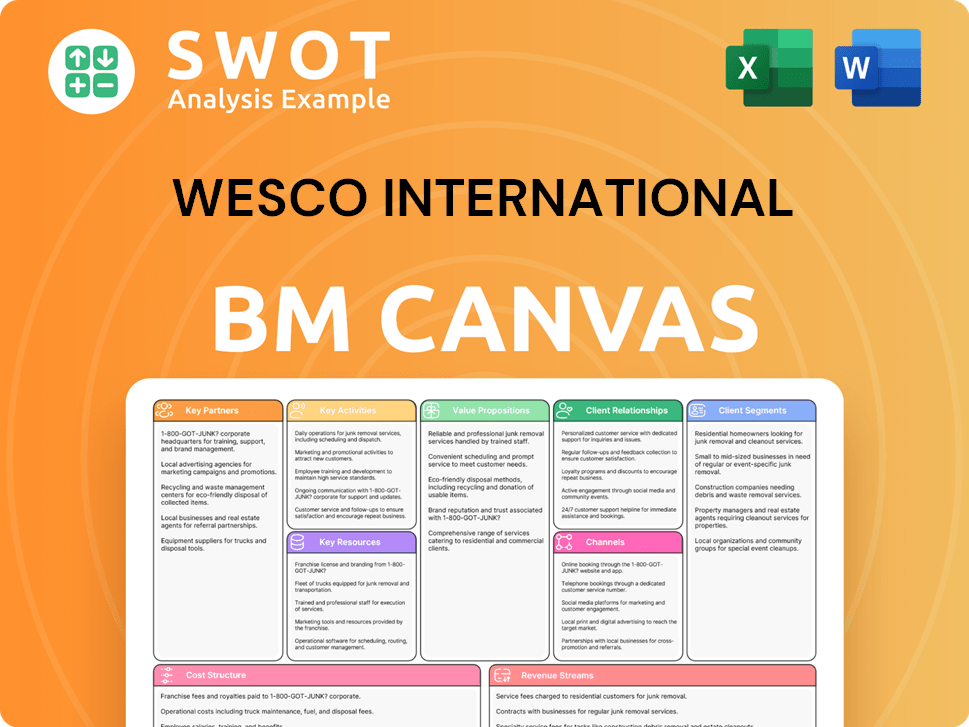
What Recent Changes Have Shaped WESCO International’s Ownership Landscape?
In the past few years, WESCO International has seen significant shifts in its ownership structure. A major event was the merger with Anixter International in June 2020, transforming the company into a Fortune 200 entity. Further changes occurred in 2024, with strategic acquisitions and divestitures aimed at streamlining operations and enhancing core business segments. These moves reflect a dynamic approach to portfolio management.
In 2024, WESCO focused on optimizing its business portfolio. The company acquired Ascent, LLC, entroCIM, and Independent Electric Supply Inc. Simultaneously, it divested its Wesco Integrated Supply (WIS) business, resulting in a gain of $122.2 million. Capital management included issuing $900 million of 6.375% Senior Notes due 2029 and $850 million of 6.625% Senior Notes due 2032. The company also repurchased $425 million of its common stock and paid $81.5 million in dividends to common stockholders. As of December 31, 2024, WESCO maintained a financial leverage ratio of 2.9x.
| Metric | Details | As of May 2025 |
|---|---|---|
| Institutional Ownership | Percentage of shares held by institutions | Approximately 99.01% |
| Mutual Fund Holdings | Percentage of shares held by mutual funds | 74.26% |
| Insider Ownership | Percentage of shares held by company insiders | 2.55% |
Institutional ownership remains a dominant trend in WESCO ownership, with major shareholders like Vanguard Group Inc., BlackRock, Inc., and The Baupost Group LLC holding significant stakes. As of May 2025, institutional investors held roughly 99.01% of the shares. WESCO plans to use excess liquidity for share repurchases, dividends, debt reduction, and investments in digital transformation, capitalizing on growth opportunities in areas like electrification and digitalization.
WESCO International's ownership structure is largely dominated by institutional investors, reflecting a stable investor base. The company's strategic moves, including acquisitions and divestitures, are aimed at enhancing its market position and operational efficiency. These actions are part of a broader strategy to drive long-term growth and shareholder value.
WESCO's financial strategy includes active debt management, share repurchases, and dividend payments. The company is also focusing on returning capital to shareholders and investing in digital transformation. These initiatives aim to optimize the capital structure and support sustainable growth.
WESCO International Porter's Five Forces Analysis
- Covers All 5 Competitive Forces in Detail
- Structured for Consultants, Students, and Founders
- 100% Editable in Microsoft Word & Excel
- Instant Digital Download – Use Immediately
- Compatible with Mac & PC – Fully Unlocked
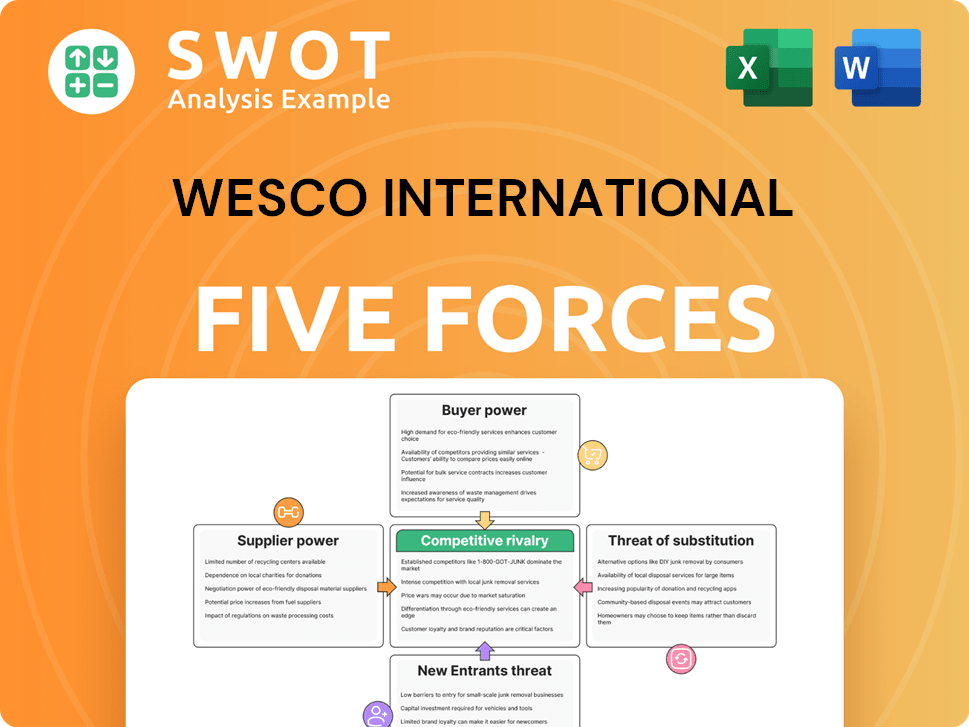
Related Blogs
- What are Mission Vision & Core Values of WESCO International Company?
- What is Competitive Landscape of WESCO International Company?
- What is Growth Strategy and Future Prospects of WESCO International Company?
- How Does WESCO International Company Work?
- What is Sales and Marketing Strategy of WESCO International Company?
- What is Brief History of WESCO International Company?
- What is Customer Demographics and Target Market of WESCO International Company?
Disclaimer
All information, articles, and product details provided on this website are for general informational and educational purposes only. We do not claim any ownership over, nor do we intend to infringe upon, any trademarks, copyrights, logos, brand names, or other intellectual property mentioned or depicted on this site. Such intellectual property remains the property of its respective owners, and any references here are made solely for identification or informational purposes, without implying any affiliation, endorsement, or partnership.
We make no representations or warranties, express or implied, regarding the accuracy, completeness, or suitability of any content or products presented. Nothing on this website should be construed as legal, tax, investment, financial, medical, or other professional advice. In addition, no part of this site—including articles or product references—constitutes a solicitation, recommendation, endorsement, advertisement, or offer to buy or sell any securities, franchises, or other financial instruments, particularly in jurisdictions where such activity would be unlawful.
All content is of a general nature and may not address the specific circumstances of any individual or entity. It is not a substitute for professional advice or services. Any actions you take based on the information provided here are strictly at your own risk. You accept full responsibility for any decisions or outcomes arising from your use of this website and agree to release us from any liability in connection with your use of, or reliance upon, the content or products found herein.